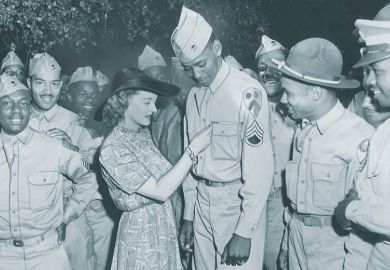Mamoun Hassan is energised by Lindsay Anderson's war on complacency but enervated by Alexander Walker's portrait of an industry in decline.
It is almost impossible to take a detached view of Lindsay Anderson or his work. Everything he did - his films, his theatre productions, his writings - and, equally important, everything he was, challenges one to take sides or, as he would have preferred to put it, to "commit". But this was often the beginning, not the end, of the journey. He considered himself - and he was - a political and social film-maker, but he never articulated a clear political philosophy. Exactly what to commit to was never straightforward.
His films and writings are shot through with ambiguity and contradiction.
At various times he emerges, superficially at least, as a communist, socialist, high Tory, imperialist and reactionary, but scratch the surface and you will always find an anarchist. And a nay-sayer: he was unambiguous and lucid about what he was against. What exercised him was a genuine hatred for the intellectually dishonest, the half-baked and the complacent - he had a fine ear and eye for them all. Especially the complacent. In the finale of Anderson's If... it is the headmaster's cry of "Boys, boys, I understand you. Listen to reason and trust me. Trust me" that earns him the bullet in the middle of the forehead.
Anderson considered smugness, coldness and condescension traits that were peculiarly English (he used to say " Innggg lish", as if it were some kind of disease). He declared himself Scottish and he was, in blood, but I have probably visited Scotland more times than he did. Still, perhaps the Scottish word fechter suits him best: it implies something more than a fighter, rather an implacable attitude akin to the lead character of This Sporting Life , the miner and rugby player Frank Machin, played by Richard Harris. He is the man who takes them on.
Anderson carried his barricades around with him. He welcomed comradeship but alienated comrades. Sometimes he would not allow you to agree with him.
Often he stood alone. "He is strongest who stands most alone," says Dr Stockmann (stick man, in Norwegian), the fighter against corruption and conformity, in Ibsen's An Enemy of the People . At the end of Anderson's life it is Chekhov who comes to mind. "To the lonely man, the desert is everywhere" was the legend on the medallion that Chekhov wore round his neck.
With all these complexes and complexities, it was and is difficult for those of us who knew or worked with Anderson to communicate the man's volatile, exasperating and inspiring temperament. Not that many people wanted to hear. After his death in 1994, his name almost disappeared from the media. Film buffs and British film-makers (but not foreigners) would look blank if you mentioned him. His cinema, his theatre work and his views were a thing of the past. Now there is something of a revival: a recent season of his films at the National Film Theatre; Malcolm McDowell's one-man show about him at the Edinburgh Film Festival and at the Cottesloe Theatre; and now two books, one about the public persona, Never Apologise: The Collected Writings , edited by Paul Ryan, the other about the private man, The Diaries , edited by Paul Sutton.
Never Apologise is a much-needed heart and brain transplant for a tired and cynical British film industry. We have lost our way yet again; our films lack distinction; and most young film-makers are desperate to sell their souls to Hollywood, but nobody wants to buy. The Diaries are a warning to other diarists to burn their diaries - to stop them falling into the wrong hands. Sutton's is a tendentious selection from the original that traduces a man he professes to admire. What emerges is not a portrait, "warts and all", but a portrait of warts.
Most of Anderson's writings have been published before, although never brought together to such powerful effect; but the diaries are new - or nearly so. Anderson's friend Gavin Lambert quoted from the "painfully lucid" entries in his memoir, Mainly about Lindsay Anderson , but there was stuff that Lambert could not or would not reveal. Sutton has no such inhibitions. What interests him most is Anderson's pathological sadomasochistic relationship with Harris. In addition to accounts of mental torture and some physical humiliation of Anderson, there are detailed entries on everything that touches on Harris. Every phone call, every missed call, every meeting, every cancelled meeting, every card, every letter is recorded. This is what infatuated people do: they obsess. Of course it is tedious to the outsider. Misery and thrill aside, it was also futile. Anderson was a celibate gay and Harris was a married and philandering straight (this was a recurring syndrome with Anderson: earlier and subsequent infatuations were also with the straight actors). You would be led by Sutton to believe that, when Anderson was not stuck in this airless and destructive relationship, he spent his time almost exclusively canoodling with celebrities, picking quarrels and later bad-mouthing them in his notebook. (My own recollection is of full-frontal attacks.)
There is another, very different perspective. Anderson was not ex-directory; his name was in the phone book and anybody could call him. Many did, and he responded generously. Fifteen-year-old Kevin Brownlow called him, and Anderson visited him at his home to see a short film on a 9.5mm projector and gave him a serious critique and encouragement. Film student Bill Douglas screened a film for him and was given pages of notes on a script. I, too, received pages of (excoriating) criticism of an early project. There are scores of other examples. Also, Anderson accommodated many struggling actors and film-makers during lean periods - such as Vladimír Pucholt, star of Milos Forman's A Blonde in Love , whom Anderson helped to settle in this country and supported through medical school.
So, Anderson was not consistent. I am not calling for "balance" from Sutton - Anderson thought that was Innggg lish for evasion and dithering - but how about complexity?
Ryan, by contrast, writes a fine introduction on Anderson's work and career. Sometimes Ryan even sounds like Anderson: "There were many who sought... to discredit him. They characterised him as 'bitter' (forgetting this word is often followed by the word 'truth')." Ryan's writing is muscular, pungent, dense and precise, and prepares us for what is to come.
That is, for total war. What events, what psychodrama possessed Anderson could, perhaps, have been gleaned from a different reading of his diaries.
What is certain is that he started life as an angry undergraduate, became an Angry Young Man, then an angry middle-aged man and ended an even angrier old man.
Maybe the anger started early, with the simultaneous abrupt separation from his father and from India, where he was born. Anderson defined himself as a "son of Empire" - both proudly and ironically. His father, himself born in India, was a major-general in the Indian Army, and his mother, born and raised in South Africa, was related to the Scottish Bell's whisky family. He was brought to England when he was four and followed the schedule of education for his class: prep school, public school (Cheltenham College, which provided the setting for IfI.) and university (he was awarded a scholarship to read classics at Wadham College, Oxford). After a year, he left Oxford and was commissioned into the Army and posted to India for the remainder of the Second World War. In 1945, he returned to Oxford and switched to English. He also published and co-edited Sequence , a film journal. From this point on, the schedule was abandoned.
Anderson was joined on Sequence by Lambert and later by Karel Reisz. Over the next five years, the world of film criticism was turned upside down. The enemy was the middlebrow, the target British cinema. Nobody, no film was safe. Step by step and insult by insult, Anderson and his companions - with Anderson the first among equals - redefined what was good and what was worthy of serious attention. Consistently he demanded and valued a cinema with "social" values, rooted in "reality", with a "serious" purpose. This combination might suggest a cinema to shun, but in fact the Sequence writers engaged generally, though not exclusively, with the popular genres - the Western, the musical and the thriller - not with highbrow films; and through detailed analysis elevated them to art. All this is familiar enough today, but in the late 1940s it was revolutionary. Sequence agonised eloquently over the question of who the artist is if film is an art, before coming to the conclusion that "the man most in a position to guide and regulate the expressive resources of the cinema is the director. To that extent it (is) the director's medium". This appeared in the autumn issue of 1950; some five years later the Nouvelle Vague critics in France propounded the auteur theory. Of course, Anderson attacked them.
However it was not for Sequence that he wrote Britain's most important piece of film criticism - "Stand up! Stand up!" (1956) - but for Sight and Sound . Its tone, its passion, its eloquence and its power may have been inspired by displaced rage over the Suez invasion earlier that year.
Anderson targeted the big critics: C. A. Lejeune of The Observer , Kenneth Pearson of The Sunday Times , Alistair Cooke of the BBC, Kenneth Tynan and others. Why did he take on the critics rather than the film-makers? Because "by celebrating the merits of the trivial and the meretricious, or by being lengthily funny at its expense, we lower the prestige of the cinema and, indirectly, make it more difficult for anybody to make a good film". Some things do not change.
"Stand up! Stand up!" has rightly acquired mythical status, but it is only one of the 137 articles in Ryan's book, which cover Anderson's thoughts on critics, the theatre, British cinema, American cinema and international cinema. It is a wonder that he had time to direct not only documentaries but also the feature films This Sporting Life , The White B us, If.. ., O Lucky Man!, In Celebration, Britannia Hospital and The Whales of August ; and to direct nearly 40 stage productions, including most of David Storey's plays.
And let us not forget his books, particularly the definitive About John Ford , and his television work, including his Channel 4 "Movie masterclass" on Ford's My Darling Clementine , not mentioned (which I produced).
In 1979, Anderson met Satyajit Ray when both sat on a film jury in Calcutta. The two had long been friends, but there was always a bit of needle between them. Anderson felt that Ray always contrived to suggest that he, Ray, was a film-maker of high repute and experience. Anderson disarmingly wrote in his diary: "I sometimes feel I am not - but then, I think I have surely achieved something ... " He surely had. And as a world cultural figure, his influence can be felt today. Read Never Apologise and you will see why.
Where Anderson was the scourge of British film-makers and critics, the late Alexander Walker was the scourge of British film institutions and the Government. They were both Celts and had a prickly relationship, although Walker admired Anderson's "rage to change". Icons in the Fire is his farewell salvo. It is the last of his trilogy about British cinema, the previous volumes being Hollywood, England: The British Film in the Sixties and National Heroes: British Cinema in the Seventies and Eighties . Walker wrote many other books, notably on Stanley Kubrick and Peter Sellers, and was, of course, the Evening Standard 's film critic for more than four decades. He was a brilliant journalist, whose reviews and articles made one feel that cinema was the most exciting experience one could have. He was never jaded - no mean feat during the first half of the 1980s, when film audiences declined. In 1984, there were only 55 million admissions and cinema was on the point of extinction as a popular art. Walker takes that as his starting point. He examines how the industry and the Government confronted the problem. It is a mix of slapstick and horror.
I was still running the National Film Finance Corporation in 1984, so I was deeply involved. In the period 1979-84, the NFFC was reviewed by three Tory ministers - Norman Tebbit, Ian Sproat and Kenneth Baker - all trying to find ways of killing the beast without too much noise. I recall a meeting with Sproat after I had sent him a position paper. He listened to my arguments in silence for nearly 40 minutes, then quietly started to write on a notepad. At last, I thought, I am getting through; I livened up. But then he pushed the note along the desk towards an aide. As it passed, I was able to read it. It said: "Coffee."
There are three ways of supporting the film industry: grants, levies and tax incentives. Margaret Thatcher and John Major found a fourth: hot air.
Meanwhile, the industry itself was faring no better. Walker charts the decline and closure of Goldcrest due to losses on what he calls the "cursed trio" of Absolute Beginners , The Mission and Revolution . David Puttnam, who had been one of the pillars of the company, left England to become chairman and chief executive at Columbia Pictures, but was back after just over a year - whether he jumped or was pushed is not entirely clear.
Cannon, owned by Israelis Menahem Golan and Yoram Globus, rolled into town and tried to acquire Thorn EMI's film assets, that is, roughly half the industry: Elstree Studios, a chain of 287 cinemas, a library of some 2,000 films, including all the Ealing films and the Pathe Newsreel collection.
Walker himself, with leaders of the industry, was involved in attempts to stop the takeover by getting Paul Channon, then Secretary of State for Trade and Industry, to halt the sale on the grounds of unacceptable monopoly. Channon would not act. Walker considers this a serious dereliction of duty because without British ownership of cinemas, there can be no independent film industry. Cannon was later forced to sell fractured pieces of our patrimony - and rolled out of town.
Walker reserves his greatest ire for industry and Government for their distortion, subversion and incompetence in administering the blood transfusion of Chancellor Gordon Brown's tax incentive in 1997. Hundreds of films were made in a haemorrhage of tax money, but to little effect. Few in the industry would disagree with Walker. But the question remains: how can the British Government support British cinema?
Without support, this patient will die. After reading Walker, I thought: why do we film-makers bother? After reading Anderson, I felt energised and challenged to fight the inertia within and the bastards without. George Devine, who ran the English Stage Company and whom Anderson admired unreservedly, put it this way: "Try again. Fail again. Fail better."
Mamoun Hassan is a film writer and producer whose latest film, the prizewinning Machuca (directed by Andrés Wood), opens soon at the Curzon Cinema in London. He was formerly head of editing, National Film and Television School, and managing director, National Film Finance Corporation.
Never Apologise: The Collected Writings
Author - Lindsay Anderson
Editor - Paul Ryan
Publisher - Plexus
Pages - 612
Price - £19.99
ISBN - 0 85965 317 X
Register to continue
Why register?
- Registration is free and only takes a moment
- Once registered, you can read 3 articles a month
- Sign up for our newsletter
Subscribe
Or subscribe for unlimited access to:
- Unlimited access to news, views, insights & reviews
- Digital editions
- Digital access to THE’s university and college rankings analysis
Already registered or a current subscriber? Login



